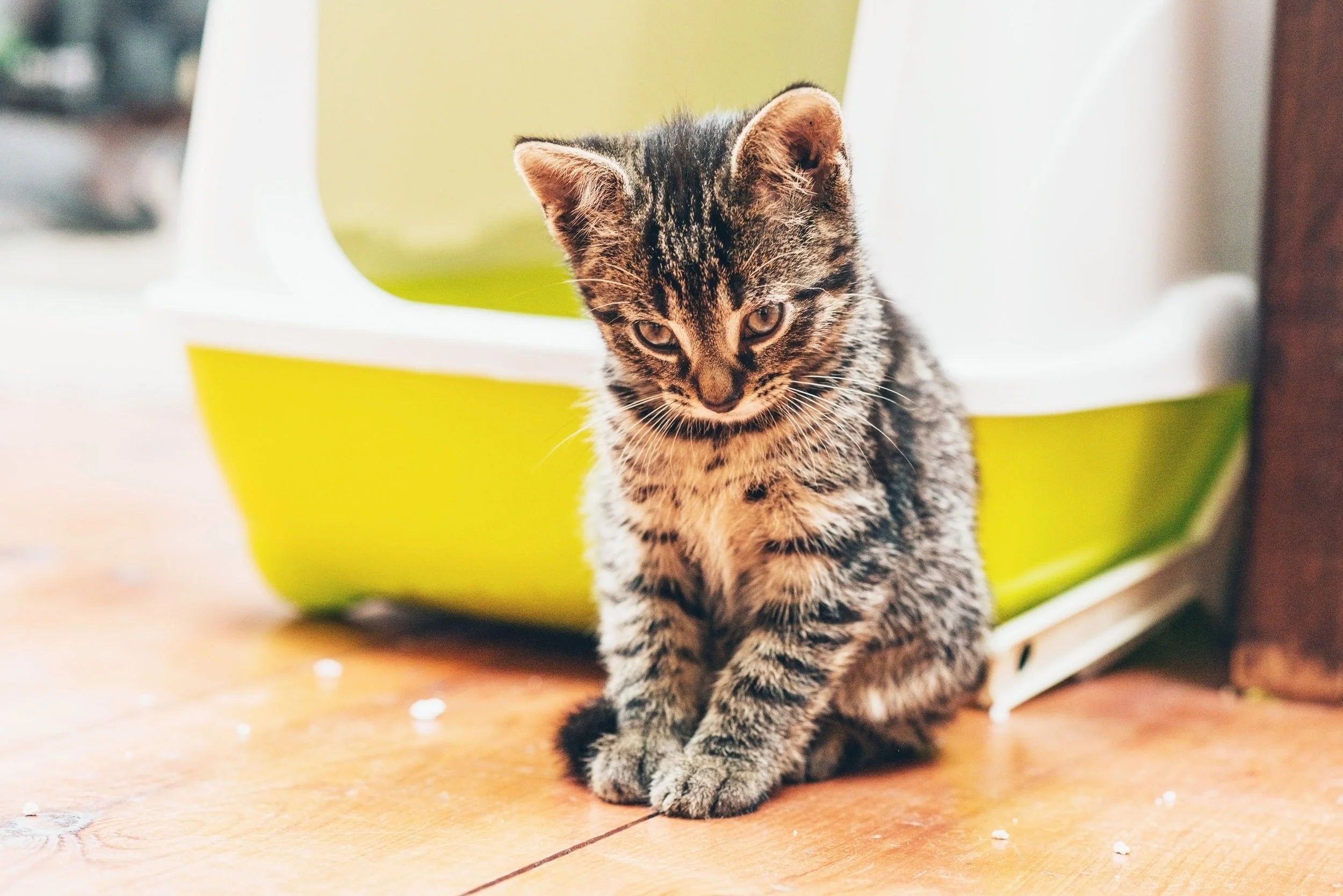Imagine this: You walk into your home, eager to unwind after a long day, only to be met with a pungent, unmistakable odor. You search frantically and find a puddle of urine on your carpet, your beloved cat watching you with an air of innocent bewilderment. This scenario, unfortunately, is all too common for cat owners. If you’ve ever found yourself in this frustrating situation, you know how upsetting and confusing it can be. Why does your cat, who once meticulously used their litter box, suddenly start peeing outside of it?

Image: www.bonvoyagepetsitting.com
Understanding why your cat might be engaging in this behavior is essential for addressing the issue. This article dives deep into the possible causes behind inappropriate urination in cats, providing you with the knowledge to navigate this challenging situation effectively. Armed with this understanding, you can start taking steps to help your feline friend regain their bathroom etiquette and restore harmony to your home.
Unveiling the Hidden Messages Behind Feline Urination
Cats are incredibly expressive creatures, and their urination habits can be more telling than you might think. Contrary to popular belief, cats don’t simply choose to pee on the floor out of spite or rebellion. There is often a deeper reason behind their seemingly inconsiderate actions. A cat’s urinary system is closely connected to their emotional well-being and physical health, making changes in their bathroom habits a signal that something might be off.
Unraveling the Common Culprits: Why Your Cat Might Be Peeing Outside the Litter Box
Understanding the various reasons why your cat might be urinating outside of the litter box is crucial for addressing the problem effectively. Here’s a breakdown of some common culprits:
1. Litter Box Issues: The Unsuspecting Source of Frustration
- Litter Box Cleanliness: Cats are fastidious creatures, and a dirty litter box can be a major deterrent. They prefer a clean, odor-free environment. If the box is not cleaned frequently enough, your cat might choose to relieve themselves elsewhere.
- Litter Box Location: A litter box placed in a busy area or in a location that is inaccessible to your cat can also lead to problems. Cats need a private, quiet space where they feel secure to use the bathroom.
- Litter Type: Some cats are sensitive to certain types of litter. If you recently changed the litter, it’s possible that your cat is rejecting the new one. Experiment with different types of litter to find one that suits your cat’s preferences.
- Litter Box Size: The litter box should be large enough for your cat to comfortably turn around and dig. If the box is too small, your cat might be avoiding it.

Image: smartlycat.com
2. Medical Matters: Unraveling the Secrets Within
- Urinary Tract Infections (UTIs): UTIs are a common cause of frequent urination and discomfort in cats. Symptoms can include straining to urinate, blood in the urine, and a change in urination habits. If you suspect your cat might have a UTI, it’s essential to seek veterinary attention.
- Kidney Disease: Kidney disease can affect a cat’s ability to control their bladder, leading to frequent urination and accidents. If you notice a decline in your cat’s appetite, excessive thirst, or lethargy, it’s important to get them checked by a veterinarian.
- Bladder Stones: These hard deposits can form in a cat’s bladder, causing pain and difficulty urinating. Symptoms might include straining, crying while urinating, and blood in the urine.
- Diabetes: This condition can lead to increased thirst and urination in cats. Symptoms can include weight loss, lethargy, and excessive hunger.
3. Behavioral Clues: Understanding Your Cat’s Emotional Landscape
- Stress and Anxiety: Just like humans, cats can experience stress and anxiety, which can manifest as inappropriate urination. Changes in your household routine, a new pet, or even a move to a new home can trigger anxiety in your cat.
- Marking Territory: Cats often use urine to mark their territory, especially if they feel threatened or stressed. This behavior is more common in male cats, but female cats can also engage in territorial marking.
- Fear or Aggression: If your cat is fearful or aggressive towards another cat or pet, they might urinate outside the litter box as a way of communicating their distress.
Expert Insights: A Guiding Hand for Relieving Feline Urinary Troubles
If your cat is experiencing inappropriate urination, a trip to the veterinarian is always the first step. They can rule out any underlying medical conditions and support you in addressing both physical and behavioral issues.
Here are some expert-backed tips to help your cat reclaim their bathroom habits:
- Clean and Maintain the Litter Box: Clean the litter box regularly, at least once a day ideally. Use a scoop to remove solid waste and refresh the litter entirely once a week.
- Offer Multiple Litter Boxes: If you have multiple cats, a good rule of thumb is to provide one litter box per cat plus one extra. This allows for greater privacy and reduces competition for bathroom space.
- Choose a Litter Box Location: Place the litter box in a quiet, accessible location away from high traffic areas.
- Try Different Litter Types: Experiment with different types of litter, and choose one that your cat enjoys. Options include clumping, non-clumping, clay-based, or silica gel.
- Address Stress and Anxiety: Identify potential stressors in your cat’s environment and try to minimize them. Consider using pheromone diffusers or sprays to create a calming environment.
- Provide Positive Reinforcement: Reward your cat verbally and with treats when they use the litter box. Positive reinforcement can be a powerful tool for teaching your cat good habits.
- Seek Professional Behavioral Consultation: If your cat’s inappropriate urination persists, consider consulting a veterinary behaviorist or certified cat trainer. They can provide personalized guidance and help you address any underlying behavioral issues.
Why Does My Cat Pee On The Floor
Taking Charge: Empowering You to Help Your Feline Friend
Identifying the root cause of your cat’s urination issues is crucial for a successful resolution. Whether it’s due to environmental factors, medical conditions, or behavioral concerns, understanding the complexity behind this behavior empowers you to confidently address it. It’s all about open communication with your veterinarian, attentive observation of your cat’s behavior, and a willingness to implement changes to create a safe and harmonious environment for both you and your feline companion.






